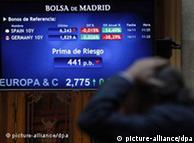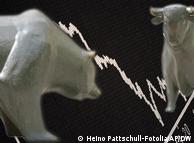FINANCE | 16.01.2012
Markets react coolly to eurozone downgrades, but analysts see clouds
European stock markets remained relatively stable on Monday - the first trading day since US ratings agency Standard & Poors downgraded the credit ratings of nine eurozone countries.
Late on Friday, S&P cut the ratings of Italy, Spain, Portugal and Cyprus by two notches and France, Austria, Malta, Slovakia and Slovenia by one notch each.
European bank shares fell in Monday trading on fears the crisis-hit sector could be the next target for rating cuts. But other top European shares barely changed from Friday's closing levels.
Stock market analysts said the S&P downgrade had been largely expected and had been priced in.
"A one-notch downgrade for France was completely priced in, so no negative surprise here," David Thebault, head of quantitative sales trading, at Global Equities, told Reuters. But, he said, the question now was how the events would affect the rating of the eurozone's bailout fund, the European Financial Stability Facility (EFSF).
Rising rescue costs
S&P said it would decide shortly whether to it would downgrade the EFSF.
 S&P wants Germany to increase funding gurantees for eurozone bailout fundThe ratings agency said on Friday that the 440-billion euro rescue fund ($556 billion) "could only retain its AAA rating through higher guarantees from the eurozone's remaining triple-A countries, or lower lending capacity."
S&P wants Germany to increase funding gurantees for eurozone bailout fundThe ratings agency said on Friday that the 440-billion euro rescue fund ($556 billion) "could only retain its AAA rating through higher guarantees from the eurozone's remaining triple-A countries, or lower lending capacity."
German Finance Minister Wolfgang Schäuble ruled out a hike in German guarantees on Monday.
"The guarantees for the EFSF are largely enough for what it has to do in the coming months," he told Deutschlandfunk public radio.
"The guarantees for the EFSF are largely enough for what it has to do in the coming months," he told Deutschlandfunk public radio.
Germany, which managed to escape S&P's mass downgrading, is one of the few countries able to keep the fund afloat.
Kai Carstensen, senior analyst at the Ifo economic research group, also warned against higher EFSF funding from Germany.
"We are approaching a situation where Germany is reaching its financial limits," he said in an interview in the Handelsblatt business newspaper.
Kai Carstensen, senior analyst at the Ifo economic research group, also warned against higher EFSF funding from Germany.
"We are approaching a situation where Germany is reaching its financial limits," he said in an interview in the Handelsblatt business newspaper.
But Andreas Dombret, a board member of the German Central Bank, told the same newspaper that "it wouldn't be dramatic if the EFSF were to lose its triple-A rating, thus increasing its borrowing costs."
"Those costs are carried by borrowing countries, and will increase their willingness to regain access to normal credit markets," he said.
New bond market jitters
Analysts believe though that the rating downgrades will adversely affect debt-laden eurozone members' abilities to refinance themselves.
 Will Spanish borrowing costs rise to unsustainable levels again?On Tuesday, Spain will be seeking to raise up to 6 billion euros from capital markets in short-term bonds, and between 3 to 4 billion euros for the longer term.
Will Spanish borrowing costs rise to unsustainable levels again?On Tuesday, Spain will be seeking to raise up to 6 billion euros from capital markets in short-term bonds, and between 3 to 4 billion euros for the longer term.
"The rating downgrade is definitely going to create headwind for the Spanish bond auction," Christian Lenk, analyst at DZ Bank, told the Financial Times Deutschland. He said he didn't believe that the country could "repeat last Thursday's auction result," in which it was able to sell twice as many bonds as envisaged at lower interest rates than before.
Aside from Spain, France will attempt to sell up to 8 billion euros of debt on Thursday.
Meanwhile, US ratings agency Moody's on Monday confirmed it's triple-A credit rating for France, but said it was reviewing whether it would maintain its "stable" outlook for the debt-laden country.
Author: Uwe Hessler (Reuters, dpa, AFP)
Editor: Nancy Isenson
Editor: Nancy Isenson


No comments:
Post a Comment